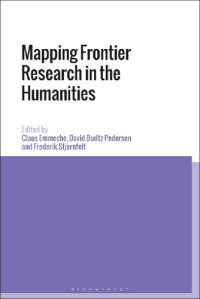
Ebook: Mapping Frontier Research in the Humanities
- Year: 2017
- Publisher: Bloomsbury Academic
- Language: English
- pdf
Knowledge production in academia today is burgeoning and increasingly interdisciplinary in nature. Research within the humanities is no exception: it is distributed across a variety of methodic styles of research and increasingly involves interactions with fields outside the narrow confines of the university. As a result, the notion of liberal arts and humanities within Western universities is undergoing profound transformations. In Mapping Frontier Research in the Humanities, the contributors explore this transformative process. What are the implications, both for the modes of research and for the organisation of the humanities and higher education?
The volume explores the intra- and extra-academic engagement of humanities researchers, their styles of research, and exemplifies their interdisciplinary character. The humanities are shaping debates about culture and identity, but how? Has neuroscience changed the humanities? What do they tell us about ‘hypes’ and economic ‘bubbles’? What is their international agenda? Drawing on a number of case studies from the humanities, the perceived divide between classical and ‘post-academic’ modes of research can be captured by a republican theory of the humanities. Avoiding simple mechanical metrics, the contributors suggest a heuristic appreciation of different types of impact and styles of research. From this perspective, a more composite picture of research on human culture, language and history emerges. It goes beyond “rational agents”, and situates humanities research in more complex landscapes of collective identities, networks, and constraints that open for new forms of intellectual leadership in the 21st century.
Whereas the classical sciences were organized around academic disciplines, knowledge production today is increasingly interdisciplinary and distributed across a variety of societal sectors. Classical disciplines have not only specialized and multiplied; they are increasingly interacting with extra-academic fields and supplemented by new transdisciplinary methods focusing on solving grand societal challenges, such as globalisation, multiculturalism, equality, democracy, security and health. Given the nature of these challenges and the ways in which university leadership has been organised, the very notion of liberal arts and humanities within Western research universities is undergoing profound transformations. This book addresses the signatures of the transformative process in the humanities and the organisation of disciplinary knowledge.
Based on multidimensional methodologies for mapping knowledge diversity, the volume outlines reasons for optimism on the potentials of the current hybrid university system. Drawing on a number of case studies and conceptual-empirical mappings of the humanities in Denmark and beyond, and avoiding simple metrics, the volume opens for an appreciation of different types of impact and styles of reasoning, both in classical and interdisciplinary fields of the humanities. From this perspective, a more composite picture of human culture, language and history can emerge from humanities research. It goes beyond the picture of rational agents, and situates human interaction in more complex landscapes of collective identities, networks, and constraints that open for new forms of intellectual leadership in the 21st century.
The volume explores the intra- and extra-academic engagement of humanities researchers, their styles of research, and exemplifies their interdisciplinary character. The humanities are shaping debates about culture and identity, but how? Has neuroscience changed the humanities? What do they tell us about ‘hypes’ and economic ‘bubbles’? What is their international agenda? Drawing on a number of case studies from the humanities, the perceived divide between classical and ‘post-academic’ modes of research can be captured by a republican theory of the humanities. Avoiding simple mechanical metrics, the contributors suggest a heuristic appreciation of different types of impact and styles of research. From this perspective, a more composite picture of research on human culture, language and history emerges. It goes beyond “rational agents”, and situates humanities research in more complex landscapes of collective identities, networks, and constraints that open for new forms of intellectual leadership in the 21st century.
Whereas the classical sciences were organized around academic disciplines, knowledge production today is increasingly interdisciplinary and distributed across a variety of societal sectors. Classical disciplines have not only specialized and multiplied; they are increasingly interacting with extra-academic fields and supplemented by new transdisciplinary methods focusing on solving grand societal challenges, such as globalisation, multiculturalism, equality, democracy, security and health. Given the nature of these challenges and the ways in which university leadership has been organised, the very notion of liberal arts and humanities within Western research universities is undergoing profound transformations. This book addresses the signatures of the transformative process in the humanities and the organisation of disciplinary knowledge.
Based on multidimensional methodologies for mapping knowledge diversity, the volume outlines reasons for optimism on the potentials of the current hybrid university system. Drawing on a number of case studies and conceptual-empirical mappings of the humanities in Denmark and beyond, and avoiding simple metrics, the volume opens for an appreciation of different types of impact and styles of reasoning, both in classical and interdisciplinary fields of the humanities. From this perspective, a more composite picture of human culture, language and history can emerge from humanities research. It goes beyond the picture of rational agents, and situates human interaction in more complex landscapes of collective identities, networks, and constraints that open for new forms of intellectual leadership in the 21st century.
Download the book Mapping Frontier Research in the Humanities for free or read online
Continue reading on any device:

Last viewed books
Related books
{related-news}
Comments (0)